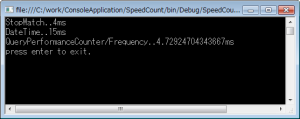.NETでの速度計測はいろいろあるのでご紹介します。
速度計測するコンポーネントの雛形を決めておきます。
ISpeedCount.cs
namespace SpeedCount
{
public interface ISpeedCount
{
void Start();
double ElapsedMilliSec();
string Format();
}
}
ここでは下記、3つの方法でやってみます。
- StopWatchクラスを使う場合
- DateTimeクラスを使う場合
- Win32APIを使う場合
1.StopWatchクラスを使う場合
.NETのSystem.Diagnostics名前空間にあるStopWatchクラスそのものです。StartNewでオブジェクトを作成し、Stopまでの時間を計測することができます。
TimeCountByStopWatch.cs
using System.Diagnostics;
namespace SpeedCount
{
public class TimeCountByStopWatch : ISpeedCount
{
private Stopwatch stopWatch;
public void Start()
{
stopWatch = Stopwatch.StartNew();
}
public double ElapsedMilliSec()
{
stopWatch.Stop();
return (double)stopWatch.ElapsedMilliseconds;
}
public string Format()
{
return "StopWatch..{0}ms";
}
}
}
2.DateTimeクラスを使う場合
DateTimeクラスは日付計算に用いますが、DateTime.Nowというプロパティが”日付”というには精度が良いので使えそうです。
TimeCountByDateTime.cs
using System;
namespace SpeedCount
{
public class TimeCountByDateTime : ISpeedCount
{
private DateTime startDate;
public void Start()
{
startDate = DateTime.Now;
}
public double ElapsedMilliSec()
{
DateTime endDate = DateTime.Now;
TimeSpan diff = endDate - startDate;
return diff.Duration().Milliseconds;
}
public string Format()
{
return "DateTime..{0}ms";
}
}
}
3.Win32APIを使う場合
Windows環境で速度計測といったらWindows Embeddedでも、QueryPerformanceCounter, QueryPerformanceFrequencyです。 QueryPerformanceCounterでは高精度タイマーの値を返します。高精度タイマーがサポートされていない場合はFALSEが 戻るようですが、いまだかつてそのような環境を見たことがありません(私は)。
TimeCountByPerformanceCounter.cs
using System.Runtime.InteropServices;
namespace SpeedCount
{
public class TimeCountByPerformanceCounter : ISpeedCount
{
[DllImport("kernel32.dll")]
static extern bool QueryPerformanceCounter(ref long lpPerformanceCount);
[DllImport("kernel32.dll")]
static extern bool QueryPerformanceFrequency(ref long lpFrequency);
private long startCounter;
public void Start()
{
QueryPerformanceCounter(ref startCounter);
}
public double ElapsedMilliSec()
{
long stopCounter = 0;
QueryPerformanceCounter(ref stopCounter);
long frequency = 0;
QueryPerformanceFrequency(ref frequency);
return (double)(stopCounter - startCounter)*1000.0 / frequency;
}
public string Format()
{
return "QueryPerformanceCounter/Frequency..{0}ms";
}
}
}
これらを使ってみるとこんな感じ。
Program.cs
using System;
using System.Collections.Generic;
namespace SpeedCount
{
class Program
{
static void Main(string[] args)
{
var speedCounters = new List{
new TimeCountByStopWatch(),
new TimeCountByDateTime(),
new TimeCountByPerformanceCounter()
};
foreach (var speedCounter in speedCounters)
{
speedCounter.Start();
for (int i = 0; i < 2000000; i++)
{
; // do nothing.
}
var val = speedCounter.ElapsedMilliSec();
Console.WriteLine(speedCounter.Format(), val);
}
Console.WriteLine("press enter to exit.");
Console.ReadLine();
}
}
}
出力は以下のような感じになりました。
DateTime.Now < StopWatch < QueryPerformanceCounter の順に精度が良くなるようですね。参考程度に言うなら、DateTime.Nowは15ms単位、StopWatchは1ms単位、QueryPerformanceCounterは1usはでてそうです。
これを使ってThread.Sleep(1)の時間を測ってみると、じぇんじぇん1msではないことがよくわかります(笑

